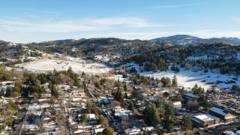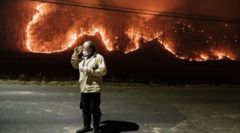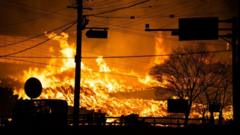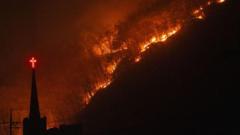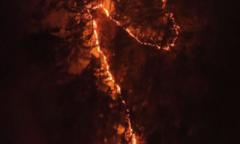Following devastating wildfires, experts recommend that Los Angeles learns from other communities to improve fire safety through neighborhood collaboration, strategic landscaping, and financial support for homeowners.
Reimagining Fire Safety in Los Angeles: Lessons from Other Communities

Reimagining Fire Safety in Los Angeles: Lessons from Other Communities
As Los Angeles faces increasing wildfire challenges, experts suggest adopting global best practices to enhance local resilience.
Los Angeles is grappling with the threat posed by wildfires as global temperatures continue to rise. Following the catastrophic fires that struck the region in January 2025, city officials and experts are advocating for a reevaluation of fire prevention strategies. Key recommendations suggest a proactive approach similar to those taken by other cities with experience in managing extreme fire events.
Among the lessons learned, community involvement plays a crucial role in fire safety. Kimiko Barrett from Headwaters Economics emphasizes that a single home can only be as secure as the neighboring residences. Consequently, neighbors must work together to minimize risk since fire can spread wildly if one property isn't maintained.
Financial constraints remain a significant barrier to effective fire management. Many homeowners in wildfire-prone areas struggle to afford the necessary upgrades to enhance their properties' safety. To address this, collaborative funding initiatives, like those seen in Boulder County, Colorado, where residents agreed to tax increases to support fire prevention measures, could serve as a model for Los Angeles.
In examining landscaping methods, Boulder County learned that certain plants, such as junipers, are highly flammable and should be removed from yards to reduce fire risks. In Los Angeles, palm trees are similarly problematic; once ignited, they are notoriously difficult to extinguish. As experts recommend, Los Angeles should examine its landscaping practices and consider banning specific fire-prone species to mitigate future hazards.
Moreover, establishing effective building codes and zoning laws can enhance community resilience against wildfires. Simultaneously, public awareness campaigns aimed at educating residents about fire safety and preparedness could foster a culture of prevention that benefits the entire community.
As Los Angeles strives to adapt to a future characterized by wildfires, taking a collective and informed approach—building on lessons from other communities—could prove vital to safeguarding residents and their homes.




